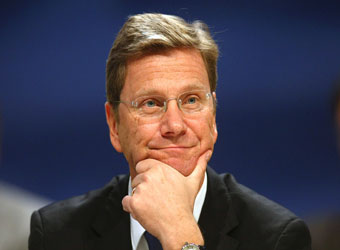Germany is dragging its feet over letting Turkey take the next step in slow-moving membership talks with the European Union amid widespread concern over Ankara’s tough handling of anti-government protests, EU officials said on Friday.
Berlin has criticized Prime Minister Tayyip Erdogan’s heavy handed response to two weeks of protests that began over a redevelopment project in an Istanbul park. Foreign Minister Guido Westerwelle urged Erdogan this week to uphold “the spirit of European values”.
A senior EU official said Germany was reluctant to open a new negotiating area with Turkey on regional policy, one of the bloc’s main spending programs for new members, as expected at the next tentatively scheduled ministerial talks on June 26.
“That’s what we have heard from the Germans,” the official said. Another EU diplomat said Germany had not officially said it would block the opening of the so-called negotiating chapter, “but we know this is an issue in Berlin, the political developments in Turkey.”
German Foreign Ministry spokesman Andreas Peschke said there was “no direct link between the events we are now witnessing and the technical process of opening further chapters on accession”. But he told a regular government news conference: “There are still many technical points that in our view need clearing up. This will take time. “Of course, the Turkish accession talks take place in a political context,” he said, adding that the negotiations that began in 2005 were “a very, very long process” which was bound to take a lot longer.
EU politicians are divided on whether it would help or harm Turkey’s democratization process to interrupt accession talks. The European Parliament’s foreign affairs committee head Elmar Brok, from Chancellor Angela Merkel’s Christian Democrats, said it would be wrong to reward Erdogan by reopening talks. Germany’s centre-left opposition, which supports Turkish EU membership, said delaying the talks would be a blow to Turkish democracy.
The EU official said Berlin was moving in the opposite direction to the executive European Commission, which believed that “more than ever, if we want to have dialogue and stability coming back in Taksim Square, there is a need to push for the negotiations for new chapters being open”.
Turkey complains about Berlin’s lack of support for its EU aspirations and accuses Europe of hypocrisy for stringing out the talks without full membership in mind. It cites Merkel’s preference for a “privileged partnership” rather than membership.
After Erdogan warned in February that making Turkey wait so long was “unforgivable”, Merkel backed new talks – but said she remains skeptical about Turkish EU membership. Turkey’s EU talks have also been slowed by an intractable dispute over the divided island of Cyprus, an EU member, and by French opposition, although Paris has eased its stance since Socialist President Francois Hollande replaced Nicolas Sarkozy last year.
Ankara has completed only one of the 35 policy chapters that every candidate nation must conclude. Some others are blocked by EU concerns about Turkish human rights and freedom of speech. Erdogan has warned that the EU would lose Turkey if it was not granted full membership by 2023.


